Moxa Media Converters - Fiber to Ethernet Converter
Moxa Media Converters offer reliable Ethernet-to-fiber conversion for industrial applications. IndMALL Automation provides a range of Moxa converters designed for harsh environments. These converters support 10/100BaseT(X) auto-negotiation and auto-MDI/MDI-X. They feature Link Fault Pass-Through (LFPT) for enhanced reliability. Available in multi-mode and single-mode fiber options with SC or ST connectors. Operating temperature ranges from -40 to 75°C for most models. Redundant dual DC power inputs ensure continuous operation. Complies with industry standards like IEEE 802.3, IEEE 802.3u/x, and EN 50155. Ideal for industrial automation and railway applications. Easy installation with IP30-rated metal housing and DIN-rail mounting.
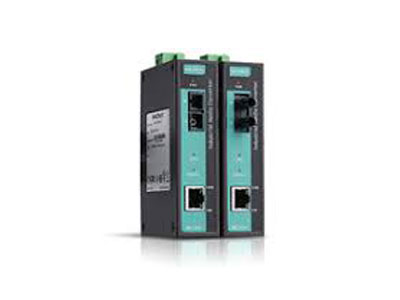
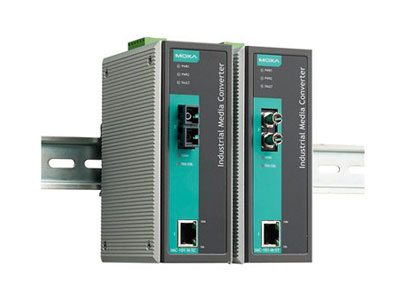
Moxa Media Converters - IMC-101 Series
Supports 10/100BaseT(X) auto-negotiation, Link Fault Pass-Through, and relay output alarms.
- Redundant power inputs and wide operating temperature range (-40 to 75°C).
- Designed for hazardous locations (Class 1 Div. 2/Zone 2, IECEx).
- Available in multi-mode and single-mode fiber options with magnetic isolation protection.
- IP30-rated metal housing and DIN-rail mounting for easy installation.
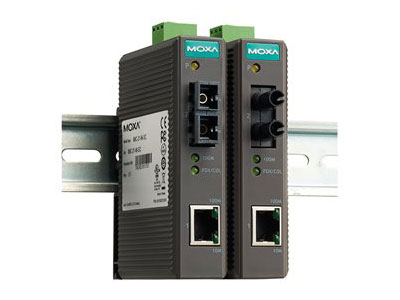
Moxa Ethernet to Fiber Converter - IMC-21 Series
Entry-level industrial 10/100BaseT(X)-to-100BaseFX media converters.
- Available in multi-mode or single-mode, with SC or ST fiber connectors.
- Features Link Fault Pass-Through (LFPT) for enhanced reliability.
- DIP switches for selecting FDX/HDX/10/100/Auto/Force modes.
- Operates reliably in temperatures ranging from -10 to 60°C.
- Supports 12 or 48 VDC power input for flexible power options.
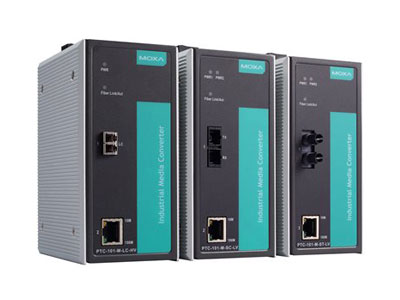
Moxa Industrial Media Converter - PTC-101 Series
Converts 10/100BaseT(X) to 100BaseFX.
- Available with SC, ST, or LC fiber connectors.
- Supports IEEE 802.3 and IEEE 802.3u/x protocols.
- Features Link Fault Pass-Through (LFPT) for enhanced reliability.
- Operates in temperatures from -40 to 85°C.
- Redundant dual DC power inputs and integrated high-reliability power supply.
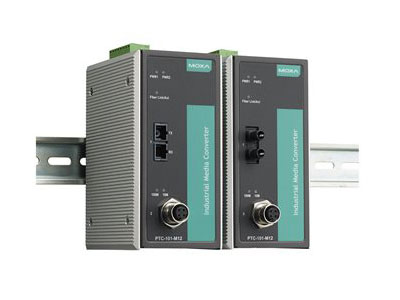
Moxa Fiber to Ethernet Converter - PTC-101-M12 Series
Converts 10/100BaseT(X) to 100BaseFX.
- Available with single-mode SC or ST fiber connectors.
- Features auto-negotiation, auto-MDI/MDI-X, and Link Fault Pass-Through (LFPT).
- Operating temperature range from -40 to 85°C.
- Redundant dual DC power inputs with power failure alarm.
- Complies with EN 50155 and EN 50121-4 for railway applications.
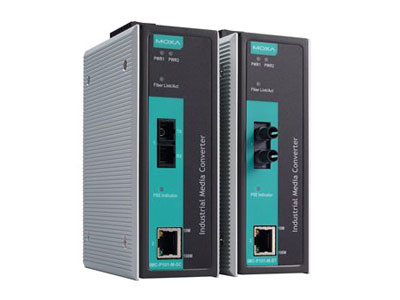
Moxa Fibre to Ethernet Converter - IMC-P101 Series
Supports 10/100BaseT(X) auto-negotiation and auto-MDI/MDI-X.
- Complies with IEEE 802.3af (PoE) and IEEE 802.3at (PoE+).
- Provides up to 30 Watts to powered devices (PDs).
- Features power failure alarm by relay output.
- Operates in temperatures ranging from -40 to 75°C.
- Redundant dual DC power inputs for enhanced reliability.
- Available with SC or ST fiber connectors for 100BaseFX.
- Supports store-and-forward and pass-through modes.
Moxa Media Converters provide reliable Ethernet-to-fiber conversion for industrial applications. IndMALL Automation offers a wide range of these converters. They support 10/100BaseT(X) auto-negotiation and auto-MDI/MDI-X. Key features include Link Fault Pass-Through (LFPT) and power failure alarms. Available in multi-mode and single-mode options, with SC or ST connectors.
These converters operate in temperatures from -40 to 75°C. Redundant dual DC power inputs ensure continuous operation. They comply with industry standards such as IEEE 802.3, IEEE 802.3u/x, and EN 50155. Designed for harsh environments, they provide robust performance and easy installation. Ideal for industrial automation, power substation, and railway applications. The IP30-rated metal housing and DIN-rail mounting make installation straightforward. Moxa Media Converters are a reliable solution for extending network reach.
Frequently Asked Questions
What are media converters used for?
Media converters are essential devices in networking. They convert Ethernet or other communication protocols from one cable type to another. For example, they change copper CATx/UTP cables to fiber optics. This conversion helps extend network distances, as fiber can transmit data much farther than copper.
Media converters are used in various scenarios. They connect different types of network segments, such as old copper-based systems to modern fiber networks. They are also vital in industrial settings where reliability and long-distance communication are crucial. By using media converters, you can ensure stable and efficient data transmission across different mediums, making your network more flexible and robust.
When to use a media converter?
Use a media converter when you need to connect different types of network cables. For example, when converting copper cables to fiber optics. This is useful for extending your network reach over longer distances since fiber can carry data much farther than copper.
Media converters are also handy for providing electrical isolation between devices. This helps protect your network from electrical interference and surges. In industrial environments, they ensure stable communication by bridging old copper-based systems with modern fiber networks. So, if you need to extend your network, connect different cable types, or protect against electrical issues, a media converter is the perfect solution.
What is a media converter in Ethernet?
A media converter in Ethernet is a device that connects two different types of network media. For example, it can link Ethernet copper cables to Ethernet fiber optics. This is especially useful when you need to connect devices that are more than 100 meters apart, as fiber can transmit data much farther than copper.
Media converters are essential in extending network reach and ensuring reliable communication. They help bridge older copper-based networks with modern fiber systems, making your network more flexible. So, if you need to connect different types of cables or extend your network beyond the usual limits, a media converter is the ideal solution.
Get a Quote for Moxa Media Converters.
